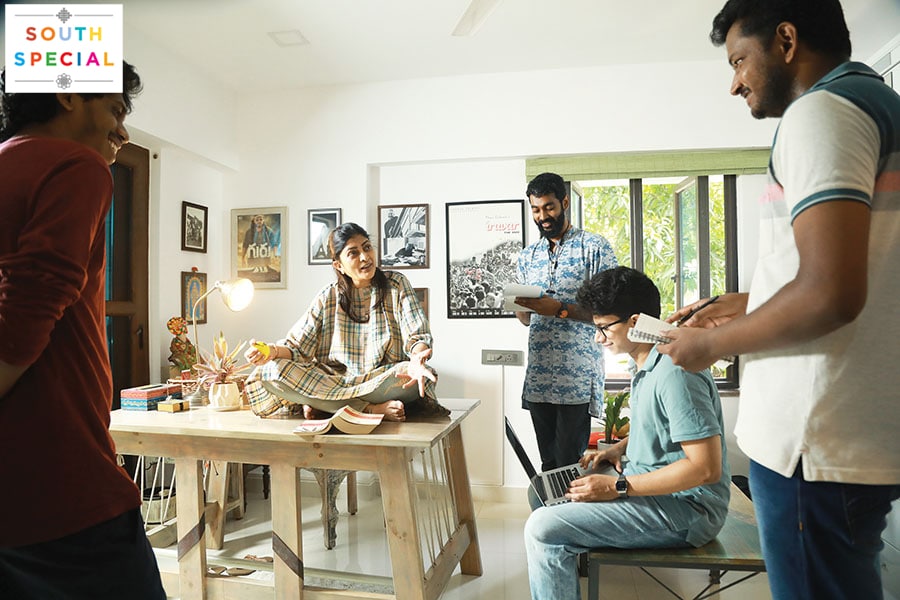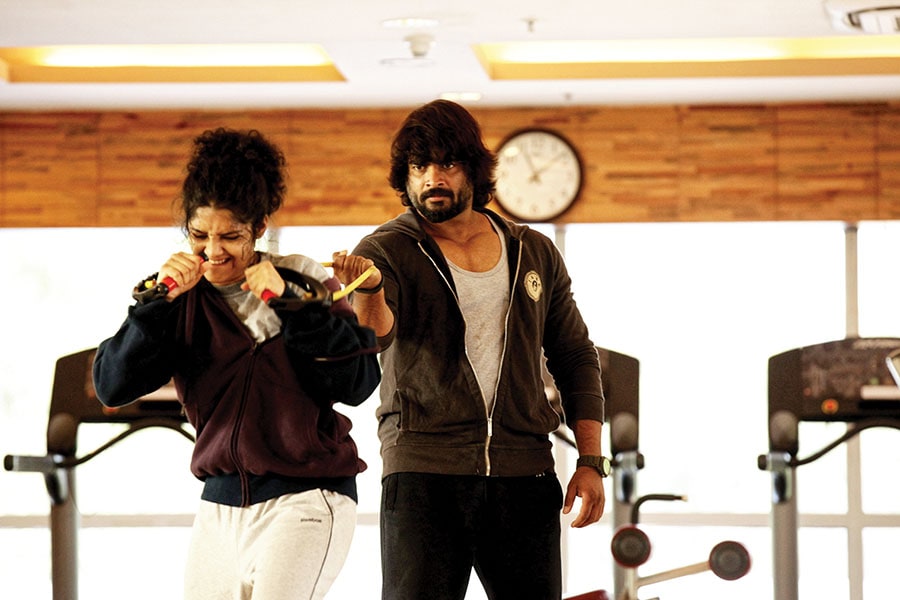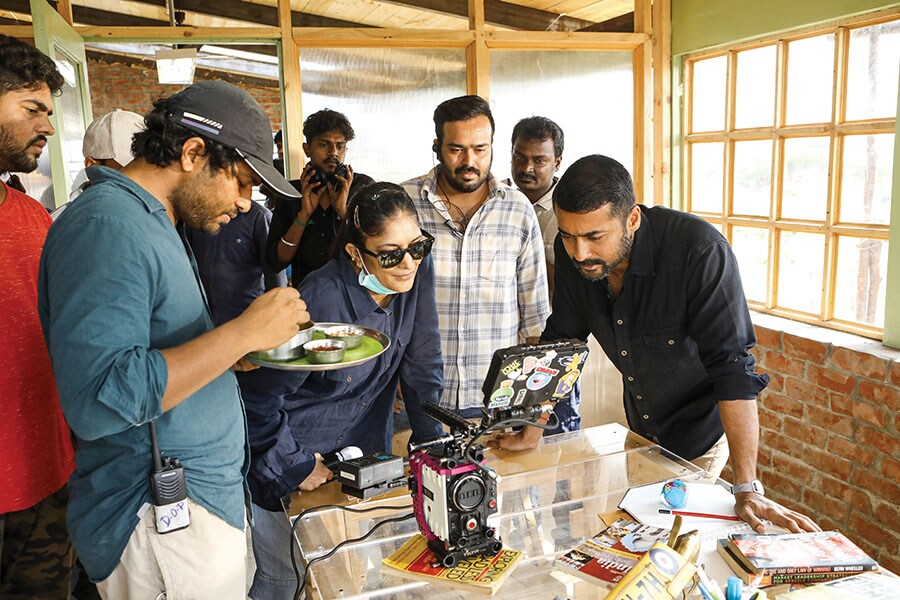Sudha Kongara: Shattering prejudices in Tamil cinema
With her recent success in making bankable commercial cinema on a big scale, director Sudha Kongara has shattered conventional prejudices against women behind the camera in the Tamil film industry


 Sudha Kongara Prasad, an film director and screenwriter
Sudha Kongara Prasad, an film director and screenwriter
Image: Balaji Gangadharan for Forbes India
Ponna irundukitu ennama padam pannarai. ‘Being a woman, you have made such a brilliant film’ is a backhanded compliment that often comes Sudha Kongara’s way. After two decades in the entertainment business, starting as a screenwriter, then as an assistant director to Mani Ratnam and eventually at the helm of her own films, Kongara believes that now is the time she has attained true power in the Tamil cinema industry.
This true power is simply having the choice to make whatever films she wants to make, in the way she wants to make them. That is tougher than it sounds, she tells Forbes India over a video call from her office in Chennai, because in a male-dominated industry with powerful, high-profile stakeholders involved with every project, there are 50 different opinions that people have about how you should go about making your film. “I was sidelined in my first film Drohi [2010], which got a limited release and tanked. My vision was corrupted by various influences and it led to a traumatic six-year hiatus," says Kongara, who confesses to having contemplated leaving the film industry behind to make a career out of growing organic vegetables or running a restaurant.
While her comeback project, the bilingual sports drama Irudhi Suttru / Saala Khadoos (2016) starring R Madhavan and Ritika Singh was well-received and even won Singh a special jury award by the National Awards Committee, the spotlight shined on Kongara since 2020, with the successes of two of her short films for anthologies on Netflix and Amazon Prime Video, and her ambitious big-budget OTT release Soorarai Pottru starring Suriya and Aparna Balamurali, which is based on the entrepreneurial journey of Air Deccan founder Captain GR Gopinath and his vision of creating a low-cost airline. The film, which was made on a budget of ₹60-70 crore, garnered over 100 million views just over the weekend of its release.
Much has been happening with Kongara since. She is now working on the script for the Hindi remake of Soorarai Pottru, setting it in a different cultural mileu, while looking at long-format projects for OTT and developing a couple of film projects, something that is likely to keep her busy for the next three years at the least. The difference in her approach hereon, having cemented her success as a bankable filmmaker of realistic cinema, is that Kongara has now reached a position where she will not budge from her vision and voice for a film, “not with my producers, not with my superstar actors, not with anybody", she says. “Time is not asking for compromises anymore."
Kongara is certainly not the first ‘female filmmaker’ in the Tamil or the South Indian film industry. There was TP Rajalakshmi, who directed Tamil films as early as the 1930s. There have also been a handful of other pioneers like Vijaya Nirmala, P Bhanumathi, Jayadevi, Suhasini Maniratnam and Revathy. Over the years, however, industry experts believe that women behind the camera in South Indian cinema have been often relegated to or expected to do only a certain kind of ‘light’ cinema, a bias that Kongara has managed to thwart.
“Instead of openly telling a woman what she can or cannot make and looking bad while doing so, people in the industry say things like, ‘You will handle soft subjects really well’, be it rom-coms or slice of life films. They cannot imagine that a woman can mount a big film on a large scale, something Sudha achieved with Soorarai Pottru," says senior film journalist Subha J Rao. The Tamil film industry has had very few female commercial filmmakers, like Farah Khan in the Hindi film industry, and Kongara possibly fills that slot now, Rao explains.
 A still from Irudhi Suttru, starring R Madhavan and Ritika Singh
A still from Irudhi Suttru, starring R Madhavan and Ritika Singh
Tamil cinema chose her, Kongara believes, from the time her family relocated to Chennai in Tamil Nadu from Visakhapatnam in Andhra Pradesh when she was a kid. Her parents were movie buffs, and her childhood was spent often bicycling on muddy roads to watch films in Sathyam Cinemas or the single-screen Eros Theatre. She grew up watching films by Bharathiraja, Balu Mahendra and K Balachander. If it was a Rajinikanth film, it would always be the first day, first show. She also saved money to rent VHS cassettes.
Kongara discovered Mani Ratnam, who would later go on to be her mentor, with his film Pagal Nilavu in 1985, when she was in Class 8. Then, in his film Mouna Ragam a year later, the free-spirited protagonist played by Revathy resonated with her deeply, particularly the scenes where she speaks up against the tradition of getting married to and being expected to get intimate with a stranger. “It was exactly what teenage women of my age were thinking at the time. That was a moment of epiphany when I realised that I wanted to make good cinema," says Kongara, who received her first marriage proposal when she was 17 and was married when she was 20.
After the marriage box was ticked, she went on to pursue her Master’s in mass communication from the Women’s Christian College in Chennai and then went to the Film and Television Institute of India (FTII) in Pune to pursue a short course in film appreciation. She was a professor of journalism and a research guide at the Madras University when she received an offer via a mutual friend to write the screenplay of the film Mitr-My Friend, which was helmed by Revathy who was working with an all-women crew. Balancing teaching with her screenwriting responsibilities is how Kongara took her first step into the entertainment industry.
“Looking back, it is like a long, surreal path you traverse," says Kongara, who soon found herself in Mani Ratnam’s office, being interviewed for an assistant director’s post. She worked with him for six-and-a-half years, between 2001 and 2007, where he made several notable films like Kannathil Muthamittal, Aayitha Ezuthu and Guru. She left after Guru to make her first film Drohi, which released three years later in 2010. She then worked as a creative producer with National Award-winning director Bala, whom she calls her second mentor, on his film Paradesi in 2012.
 Sudha Kongara with Suriya (extreme right) and the crew on the sets of Soorarai Pottru
Sudha Kongara with Suriya (extreme right) and the crew on the sets of Soorarai Pottru
Kongara eventually found her second lease of life as a director with Irudhi Suttru thanks to actor R Madhavan, who believed in her despite all odds, like not getting a producer who was willing to back her vision. “There were times when I told Maddy that producers are not coming on board because of me, and that he should just take the story and make it with a better director, a ‘male’ director. And Maddy went to every producer, both in Hindi and Tamil, and was himself narrating the script," she says. Soon, Kongara worked with director Rajkumar Hirani, whom she considers her third mentor as he taught her the nuances of editing, and who came on board as a producer for the sports drama. The voices and working styles of each of her mentors were different, but they all helped Kongara find the kind of cinema that called out to her and influenced her craft. “I realised that I am a very ‘lowest common denominator’ kind of filmmaker. I love mass films that are commercial and full of drama, action and emotion," she says.
Kongara’s ability to take even a clinical subject, like a business story in the aviation sector, find its emotional core and make it appeal to everybody is one of her biggest strengths, says writer-director Shalini Ushadevi, who wrote Soorarai Pottru along with Kongara and is now working with her on future projects. “That her stories resonate with everyone across the board is important to Sudha. She never takes a single dialogue for granted, is very disciplined, research-oriented and is constantly questioning why something should be a certain way in the film," says Ushadevi, who says that Kongara always thinks in terms of scale and her canvas is huge. “Before writing any scene, Sudha would put herself in the situation, where she would feel what her character might have felt. It is a very honest process, where you open yourself up and look inside."
Rao, who believes that one of the best things about Kongara’s process is that she places equal emphasis on writing and direction, says that apart from writing strong female roles, Kongara’s characters always espouse a certain dignity and strong moral code. “I really liked the way she treated the character of her transperson protagonist Sathaar in Thangam [the short film Kongara directed as part of Netflix’s Paava Kadhaigal anthology in December 2020]. She got on board transwomen and they were there at every step to ensure she never went off meter while writing the character," she says.

Actor Kalidas Jayaram, who essayed the role of Sathaar, says Kongara had promised him that his character in the film will be “immortal" if he works hard for it. “She was very particular about accurately and sensitively depicting Sathaar on screen. She made me meet and attend workshops with a lot of transwomen and people from NGOs who work closely with members of the transgender community. She would show me documentaries on real-life incidents similar to what Sathaar experiences in the film. She kept subconsciously feeding me this character without me even realising it, guiding me at every step of the way," says Kalidas, who also worked with Kongara in the short film Ilamai Idho Idho that is part of Putham Pudhu Kaalai on Amazon Prime Video, an anthology made during the Covid-19 lockdown. Kalidas calls Kongara a perfectionist because of her ability to conceive every role in so much detail that she knows exactly how every dialogue has to be delivered and how a scene has to play out. “At the same time, she also lets her actors be, appreciates them and gives them the space to explore their characters on their own," he says.
Actor Aparna Balamurali, who plays Bommi in Soorarai Pottru, says Kongara believes in doing extensive homework and pre-shoot prep in the form of script readings with every cast member, workshops, dialect training etc. “Reading the script before shooting is very important for her. She does not emote a lot while directing a shot, but she gives you very specific, subtle and minute details about what she wants. She has amazing clarity of thought," says Aparna. “She works so hard on the set and manages everything in a way that we are able to shoot at a brisk pace."
Kongara’s success, however, is a result of many years of being hard on herself, simply because she felt that as a woman, she had to work doubly hard compared to her male counterparts to be taken seriously. “I always carried a huge boulder on my shoulder, thinking that if I take leave, people will write me off saying things like, ‘Oh, she is menstruating’, or ‘She has kids and a family, so those are her priorities’. At the same time, my male counterparts would ask for holidays often, and I would be left covering for them," she says. “For the longest time, I have fought against being thrown into a niche of making small cinema, ‘chick flicks’, rom-coms or whatever ‘they’ decide a woman should be making."

Rao believes that the best from Kongara is yet to come. “She is someone who has grown leaps and bounds with every film, and has not stopped growing. For a couple of more years, I will keep saying that her best is yet to come, because Sudha is someone who never settles for a certain standard," she says.
Picking herself up after a failure is particularly excruciating, because “you fight multi-level battles when you fail", says Kongara, “At home, they tell you that you should quit and just take care of the kids. At work, they say you flopped because ‘inda pombalainga enna thaan pa padam edupaanga (what movies can these women make?). You are written off at various levels, so after a good big failure like my first film, coming back was challenging, but I did it and I am not complaining now. The tables have turned."
First Published: Oct 20, 2021, 11:53
Subscribe Now